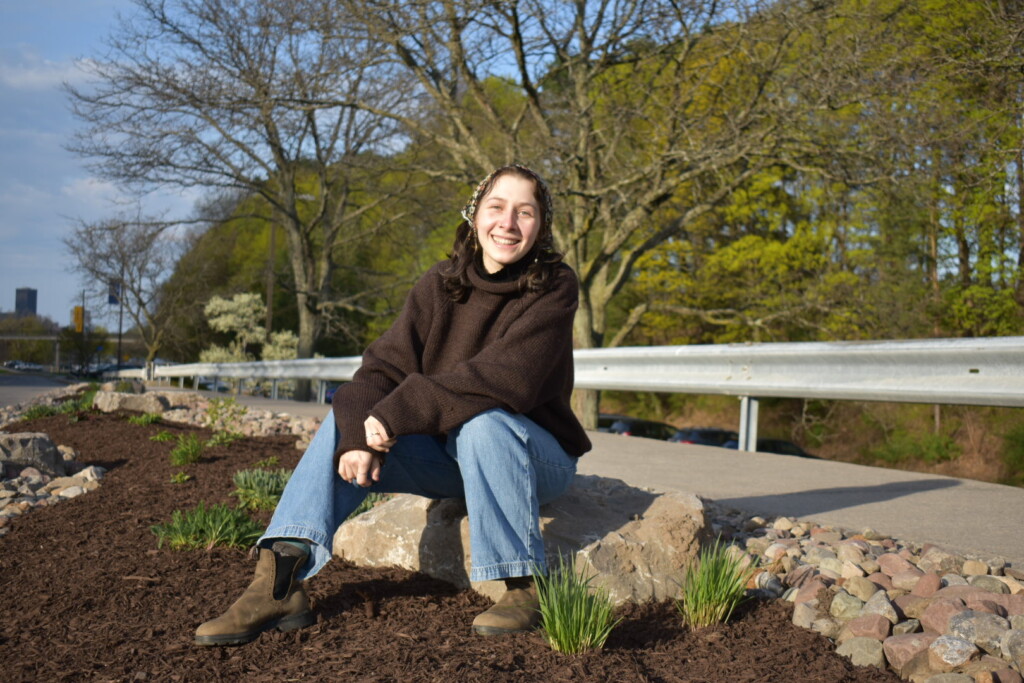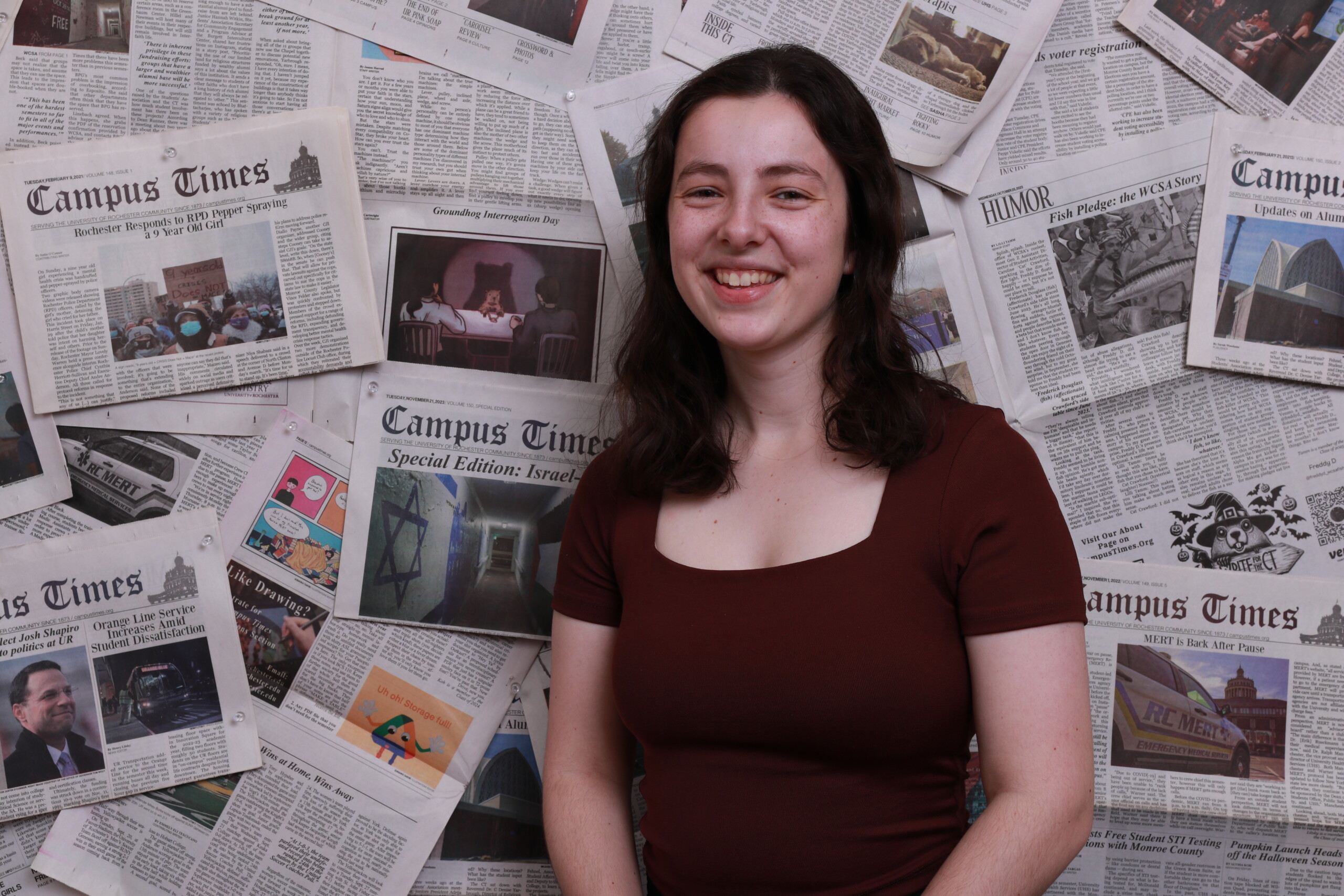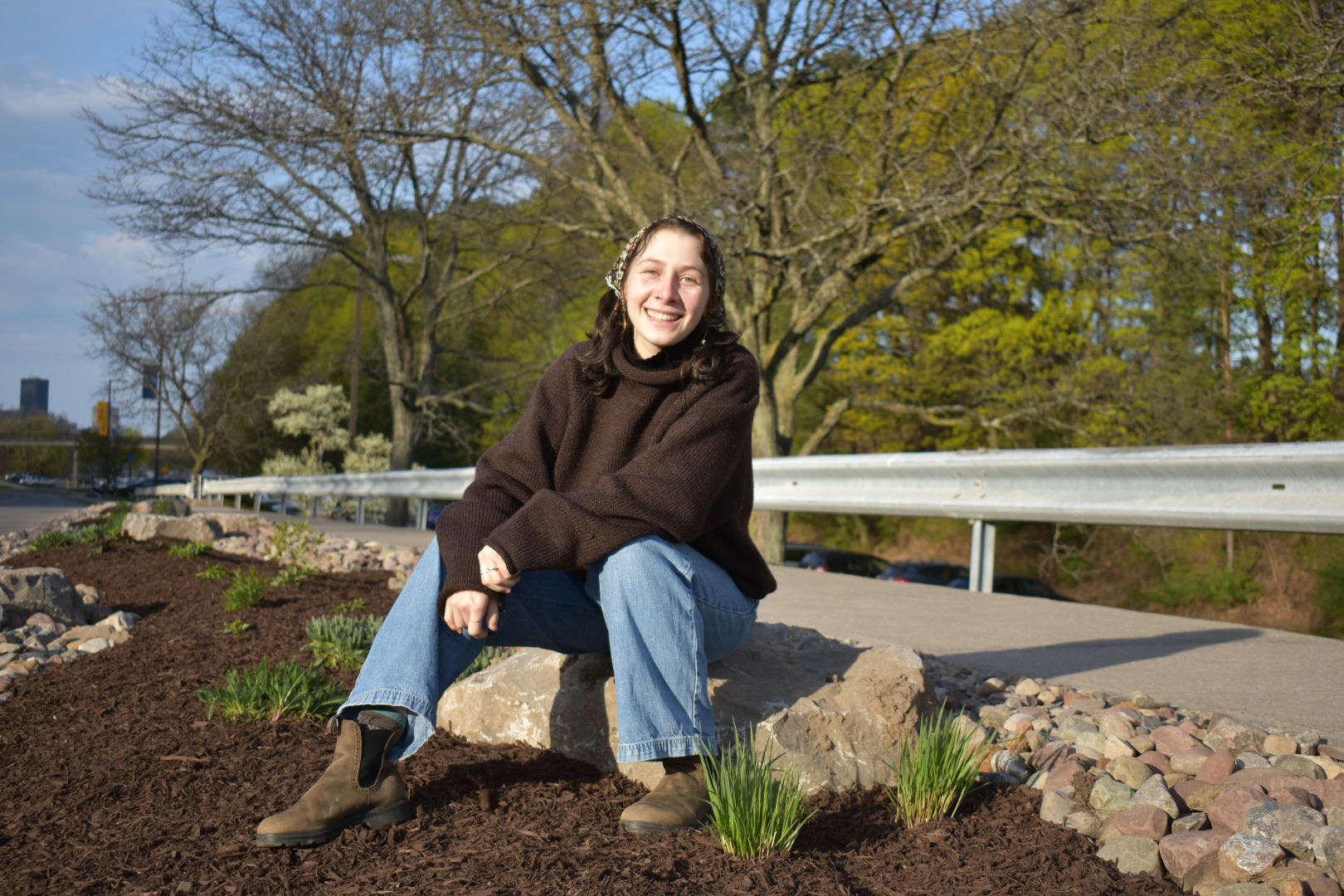On April 10, the University became officially Bee Campus certified. This process was initiated by senior Zoë Bross in her sophomore year on campus. Bross, who grew up working at her mother’s garden store in New Jersey, is finishing her college career with an impressive repertoire: a major in Environmental Studies, two minors in Anthropology and Studio Arts, and — on behalf of the University — a Bee Campus Certification.
Bee Campus USA is a subset of Bee City USA, an initiative started by the Xerces Society for Invertebrate Conservation. The purpose of Bee Campus USA is to advocate for the conservation of native pollinators on college campuses by increasing the abundance of native plants, providing nest sites, reducing the use of pesticides, and offering educational opportunities that incorporate pollinator conservation.
Bross first heard about Bee Campus USA through her high school best friend Kayleigh Silverstein, who attends the University of Utah. Her friend worked for their campus newspaper and mentioned interviewing someone for Bee Campus. After googling what a Bee Campus was, Bross was taken aback. “I couldn’t believe that our school wasn’t certified because we always talk about […] being so into sustainability and all that,” she said. “And our mascot is literally a yellow jacket! Which, for the record, is not a pollinator, but still looks like a bee.”
Bross also found out through an environmental science hydrology project that becoming Bee Campus certified would give the University more points on the Advancement of Sustainability in Higher Education Sustainability Tracking, Assessment & Rating System (STARS) program, which assigns ratings to campuses according to their sustainable efforts. The University currently holds a silver rating.
There are eight requirements to become Bee Campus certified. The first major step for Bross was creating a standing Bee Campus committee with a mix of students, faculty, and staff. Currently, the committee is led by her and Professor Robert Minckley, with junior Sahara Walto as the student co-chair in training. Also on the committee is Manager of University Horticulture and Grounds John McIntyre, along with Matt Austin, who works for Grounds as well. However, the steps to getting to this point were not straightforward.
Bross’ first step was to reach out to Professor Karen Berger who teaches many sustainability related courses in the Earth and Environmental Sciences Department. “Unfortunately, she had too much on her plate at the time to help me so she directed me to some other people on campus who were interested,” Bross said. As a result, she ended up talking to McIntyre, in the fall semester of her junior year for a project in her Energy and Society class (course listing).
“He was super into the idea,” Bross said. “First time I met with him, John was so friendly and enthusiastic. He has literally been the best this whole time and has been so supportive.”Getting Bee Campus certified would need the full support of Grounds because they would be the one planting the pollinator gardens, as well as executing their integrated pest management plan.
Throughout the year, Bross also talked with Cam Schauf, who was the Director of Campus Dining Services and Auxiliary Operations. He was also very supportive and created a job for Bross within Dining Team Green to help her continue her work, Sustainability Marketing Coordinator. Schauf has since retired, but Bross has retained her position and appreciates the support of her new bosses at Dining who are continuing the push for sustainability. “Of course, bees and pollinators are the reason that we have food!” Bross pointed out. “All of the produce gets pollinated by pollinators. And if we didn’t have pollinators, we wouldn’t really be able to eat.”
This past semester has been a lot of bureaucratic work for Bross, who had a lot of forms to fill out and needed the Office of the President’s approval on the project.
As a part of the community engagement aspect of Bee Campus certification, Bross planned the UR Bee Campus Pollinator Garden Planting event that occurred this past Wednesday, April 19. “I was absolutely stressed out of my mind leading up to it,” Bross said, “Because I take on a lot and I have this problem where I don’t always ask for help.” However, once she reached out to her team on the committee, they were happy to help.
McIntyre — and other staff from Grounds — picked out the new garden location, ordered the plants and seed packets locally, provided event materials such as mulch and shovels, and brought out a hydroseeding tank and hose to spray wildflower seeds on the hill behind Susan B. Anthony Hall (Sue B.).
In addition, Walto assisted her with the CCC activity registration for the event and Dining provided the funds for the UR Bee Campus bucket hats from Big City Tees and stickers. University Catering got creative and provided “bee-themed” snacks for attendees. Bross designed the stickers and hats herself, along with writing a blurb for the @Rochester newsletter to advertise the event and coordinating with a professional photographer to shoot the event.
“I am absolutely overjoyed about the turnout and how it went,” Bross said. “I could not have imagined anything better except for it being warmer and sunny. However, it is Rochester. I will take what I can get!”.
Over 100 people showed up to help plant in the garden, with Bross running out of bucket hats to hand out within the first half hour of the event, which was originally planned for three hours. After the planting was done, Grounds set up their hydroseeder and let attendees take turns spraying the hill behind Sue B.. with a mixture of water and wildflower seeds, making the area more pollinator friendly. Rocky, the school mascot, even made an appearance, supervising the gardening and taking a turn with the hydroseeder hose.
After a university campus is certified by Bee Campus USA, it must submit a renewal application annually, detailing the previous year’s activities. Bee Campuses are expected to continue maintaining or enhancing pollinator habitats on campus, as well as maintaining an educational online presence. “I see the campus continuing to be very interested,” Bross stated, reflecting on the impressive attendance at the pollinator garden planting event.
Future plans for our campus include more pollinator gardens, native wildflowers, and even bee sculptures to provide new habitats. As for Bross? She pictures herself somewhere warm and sunny in the near future, possibly working in environmental communications and BEE-ing the change she wants to see in the world.



